Summer Program FAQs
We hope the Program FAQs below help to answer your questions about Tawonga’s upcoming season. This page provides our best answers at this time. We will keep content on this page up to date and our Camp families closely informed.
Registration & Programs
🗓️ Registration and program dates
Registration is Now Open to the Public!
✔️ Who’s Eligible? Anyone! Open to the entire community
✔️ New to Tawonga? Get started here.
✔️ Returning to Tawonga? Get started here.
Click here for 2026 registration FAQs including details about the registration process and financial assistance.
Visit www.tawonga.org/dates-rates to view 2026 program dates.
📅 Choosing the Right Summer Camp Session Length
Every Tawonga session offers classic camp activities, meaningful Jewish experiences, and a supportive community. As sessions get longer, campers have opportunities to go deeper – from extended adventures like backpacking to celebrating Shabbat at Camp.
Explore the graphic below to see how 1-, 2-, and 3-week sessions compare.
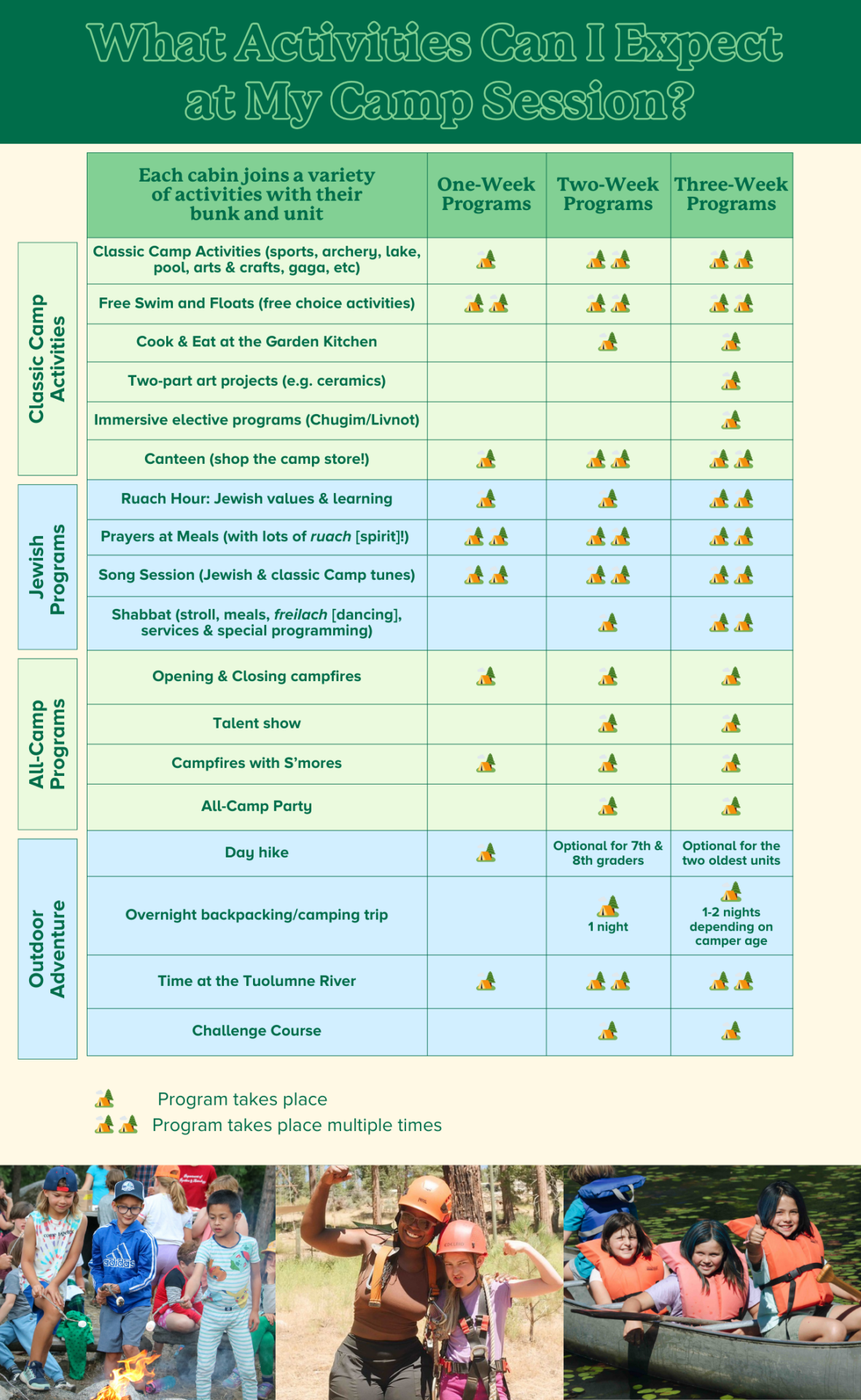
🌲 Adventure Quests
🏳️🌈🏕️ All-Gender Cabins
⛺ Rising 4th-6th graders – Session 4 (July 26 – August 7)
⛺ Rising 7th-8th graders – Session 2 (June 14 – July 3)
⛺ Rising 9th-10th graders – Session 3 (July 5 – 24)
If there isn’t enough interest in an all-gender cabin, we will reach out to enrolled families individually to explore options. In addition, if there is sufficient interest among other sessions and age groups, we may consider adding additional all-gender cabins as well. ALL of our counselors are trained on how to create a safe and welcoming space for campers of all genders in EVERY cabin.
If you are interested or have any questions, please email [email protected].
Click here to learn more.
🌟 Teen Leadership Institute
Teen Leadership Institute (TLI) is a bridge between the traditional Tawonga camper experience and 12th grade staff in-training program. This unique program will enable teens to take the Tawonga mission on the road and then return to Camp to give back as leaders.
TLI Teens will travel throughout California together and onto Portland, Oregon and will engage in leadership development, community service, and outdoor adventures. They will end their program at Camp Tawonga to bring the adventure home and establish themselves as Tawonga’s next generation of young adult leaders. For more information about the program, click here.
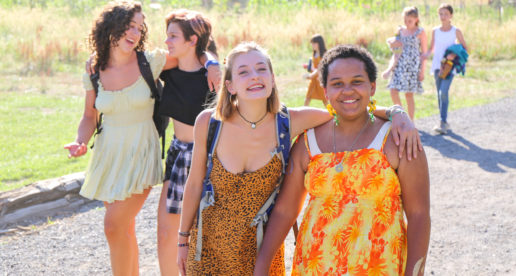
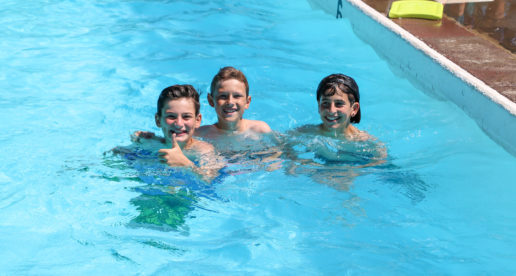
General Summer Camp Questions
💖 Are Tawonga staff prepared to work with my child’s needs?
Yes! We carefully train our staff to meet your child’s social, emotional, behavioral, and physical needs. We treat each child as a precious individual, and, at the same time, facilitate the kind of immersive group living and bonding experiences for which Tawonga is renowned. We provide high-quality supervision in every part of daily life at Camp. Each session, a total of nearly 200 counselors, supervisors, specialists and support staff serve 300 children — ensuring not only excellent ratios, but dedicated, attentive care throughout the day and evening. All staff undergo thorough background checks and complete a week-long training to support them with group supervision, conflict management, supporting individual camper’s needs, and much more prior to camper arrival.
The minimum certification for any Tawonga staff member working with children is CPR and First Aid, and Wilderness Leaders are certified as Wilderness First Responders. Our counselors are all trained in supervision expectations, group oversight, and how to keep campers accounted for across transitions and activities.
If you have any questions about specific accommodations that your child might need, you may email Ashley Costello, Senior Director of Camper Care at [email protected] or Shoshie Flagg, Director of Family Engagement at [email protected].
💬 My child is nervous about going to Camp, do you have any advice?
This is common! Click here for tips to prepare your child for Camp.
Join an orientation session in the spring for parents to learn more about what to expect and get questions answered.
Access your program roster (available starting in the spring) by logging into your CampInTouch account or Campanion app. Click “Forms & Documents” and then click to download. You can use this to connect with other families in your area before the session to coordinate some meetups.
Join an optional parent’s Facebook group to engage with fellow Camp parents in your child’s session, ask other parents questions and set up playdates (not applicable for SCIT and TLI teen programs). Find session specific links to join here starting in the spring.
For new families interested in checking out Tawonga before sending your child to Camp:
- Join an at-Camp tour over Memorial Day Weekend, offered May 24, 2026. Email [email protected] to sign up.
- Register for Ready, Set Camp: April 24-26 – Designed for families with children in rising 2nd-6th grade, this weekend is a two-night introduction to Camp for families with new or prospective future campers.
If you have further concerns and want to brainstorm ways to prepare your child for Camp, email [email protected] to schedule a call with a director. We’re happy to help!
Having cold feet and considering canceling?
Before making the decision to cancel your child’s registration, please call us! We see our role as a partnership with you and want to ensure we provide you the support you need to navigate feelings of nervousness. It’s completely normal for children (and parents!) to feel some anxiety about Camp, especially if it’s their first time (though we know that even seasoned campers have these feelings from time to time). We’d love to make a plan with you to avoid your child missing out on a transformative camping experience, if possible!
🏠 Missing home & missing your camper
Missing home
Coming to Camp may bring up feelings of “homesickness.” We consider this a normal and healthy occurrence for children, and we use the phrase “missing home” to help separate these feelings from the idea of being sick.
Counselors are trained to notice each camper’s moods and emotional adjustment. If a child is missing home, counselors will:
- Listen empathically
- Normalize these feelings
- Encourage participation in cabin activities
- Help facilitate friendships
Having fun and building connections are often the best remedies. Experience shows that within two or three days, most campers are happily engaged with new friends and counselors.
If additional support is needed, bunk counselors may involve unit heads, camp therapists, and directors. If a camper is missing home intensely or for an extended period, we will reach out to you to partner on the best ways to support them. We are ready!
What if I get a homesick letter?
It’s common for families to receive a “homesick letter” early in the session. These letters might say anything from “I’m homesick, come get me” to “Camp isn’t fun.”
Here’s what to know:
- Don’t panic!
- These letters are often written in the first 24–48 hours.
By the time you receive it, your child is likely already adjusted and having fun.
We strongly encourage you to write back with an encouraging, confident message right away.
If you receive a second letter that sounds unhappy, please call us at 415.543.2267. We will check in with camp staff and update you within 24 business hours. Our team prioritizes each camper’s physical, mental, and emotional well-being, and you will always be contacted if your child is struggling beyond the typical adjustment period.
Missing your camper
It’s not just campers who feel big emotions – parents can too! While children may feel “homesick,” some parents feel “campersick.” This is a completely normal part of sending your child to summer camp.
We encourage you to:
- Project confidence and excitement as your child prepares for camp.
- Know that children often mirror their parents’ attitudes.
- Trust that no news is good news.
By encouraging your child to have a great experience, you are supporting their success at Camp. Over the summer, we invite families to embrace the beauty of healthy separation – and the joy of knowing your child is building independence, friendships, and memories that will last a lifetime.
🛏️ Bed wetting
Each child develops at their own pace, and we know that for some campers bed wetting can be a challenge. We handle bedwetting sensitively and confidentially, with an individualized proactive plan that allows campers to feel comfortable while at Camp. Typically, we implement a plan that includes having an extra sleeping bag in a cabin for sporadic bedwetting, and a pull-up plan for campers who wet the bed nightly. If your child needs a bedwetting plan to be put into place, please call our office at 415.543.2267 and speak with a director.
🆕 New campers
My child has never been to Camp and doesn’t know anyone. Is this typical?
Yes – this is very common. Every session has a mix of new and returning campers, and everyone has a first summer at Camp.
Tawonga has built its reputation as a warm, welcoming place for every child by paying careful attention to the emotional experience of each camper. We create a non-competitive environment in which there is no hierarchy between kids. Our group-centered philosophy brings kids of diverse experiences and backgrounds together and facilitates deep and lasting friendships.
How do I know which program is best for my child?
All Tawonga programs are grounded in our mission and traditions, while offering different styles of adventure:
- Summer Camp Sessions: These sessions at our Yosemite location offer the quintessential “camp” experience, including hiking, swimming, boating, campfires, sing-alongs, and arts and crafts in a group-centered environment.
- Adventure Quests: Camp on the road – an adventure-based road trip experience that builds independence, confidence, and connection.
Whether your child attends a week of summer camp or three weeks on an Adventure Quest, our staff will provide a safe, supportive environment for campers to feel great about themselves while deepening their independence, exploring Judaism in a beautiful, natural setting and developing a sense of belonging in our warm, inclusive community.
When choosing a program and program length, the best guide is your child’s readiness and interest:
- For campers new to being away from home, one or two weeks can be a great place to start.
- Campers with more comfort or a strong sense of adventure may enjoy longer sessions or Quest programs.
Remember that it’s normal for campers (and parents!) to feel nervous about being away from home, and this is a natural part of the overall camp experience.To discuss your child’s particular needs, please call our office to speak with a director. We’re happy to help!
📚 Information sessions and orientations
Click here for more information and to RSVP for upcoming information sessions and orientations. New Family Orientations will take place virtually in April and May.
🏕️ Cabin life
Tawonga offers boys cabins, girls cabins, and all-gender cabin options. Click here to learn about cabin life at Camp including physical cabin and bathroom details, days spent with the cabin group, cooperation amongst bunkmates, cabin assignments and inclusivity.
🚌 Transportation
Families have a few options for getting campers to and from Camp depending on their enrolled program. Options include charter buses, driving to/from Camp with family or carpooling with another family attending the same session.
Click here for more information about transportation.
👀 Can parents visit Camp?
We do not allow family members to visit campers while they are attending a session. This would interfere with you and your child making a healthy separation, which is a big part of the way kids gain confidence, independence and maturity at Camp.
However, your whole family can visit Camp in the following ways:
- Register for Ready, Set Camp: April 24-26 – Designed for families with children in rising 2nd-6th grade, this weekend is a two-night introduction to Camp for families with new or prospective future campers.
- Attend a Family Camp weekend program at Tawonga to meet our wonderful staff, see our beautiful property and get a taste of the Tawonga experience.
- Sign up for a tour of Camp with one of our directors during our Memorial Day Weekend on May 24, 2026.
✡️ Judaism at Camp
Judaism is infused into daily life at Camp, from the Hebrew blessings we sing at every meal to to rich Shabbat celebrations. Your child’s Jewish experience will come through exploring Jewish values, customs, and traditions woven into camp programming each day. Tawonga’s approach to the Jewish experience is a joyful blend of culture and ritual, and invites campers to connect with spiritual and Jewish moments that resonate personally with them.
Tawonga campers include kids who are highly affiliated with their Jewish communities (through synagogue, JCC, or day school), kids for whom Tawonga is their primary Jewish experience, kids from interfaith families and kids who are not Jewish. They all share great Jewish experiences because we offer – and never force – a positive, fun, inspirational and uplifting “buffet” of Jewish experiences.
Shabbat at Camp
Shabbat is a highlight at Camp during our 2+ week programs:
- Shabbat stroll
- A delicious Friday night dinner
- Freilach (joyful singing and dancing)
- Outdoor Kabbalat Shabbat and Saturday morning Torah services, surrounded by the gorgeous backdrop of tall trees, blue skies, and the Tuolumne River
- Special Saturday programming and food
Many campers come home with a new appreciation for the beauty of our Jewish heritage and a deepened sense of pride in their own identity.
Whether your family attends synagogue regularly or never at all, Tawonga is a warm and welcoming Jewish home for your child. You can learn more about Tawonga’s approach to Judaism and spirituality here.
🍲 Meals
Our meals are served family-style in a large dining hall and are nut-free and kosher style. Our food is prepared fresh on-site and is both delicious and nutritious.
Our Alternative Foods kitchen ensures that every meal includes:
- vegetarian, vegan, gluten-free, and dairy free options
- Accommodations for a wide range of food allergies
In addition to our main meal, we always have options available for picky eaters:
- Breakfast: hot and cold cereals, hard boiled eggs, and yogurt with toppings
- Lunch: sandwich and salad bar
- Dinner: sandwich and salad bar, plus plain pasta
We work closely with campers to make sure there is always something they enjoy eating – even our pickiest eaters never go hungry.
Practicing Mealtime Independence
Practicing a few simple mealtime skills at home before camp can help children feel more confident and successful in the dining hall. Helpful skills to practice include:
- Pouring a bowl of cereal
- Spreading a sunbutter and jelly sandwich
- Trying new foods (even just one bite!)
- Setting and clearing the table
Learn more about food and nutrition at Camp here.
⏰ Daily schedule
Click here to see an example of a typical day at Camp this summer.
📱🚫 Technology policy
Camp is a wonderful opportunity for kids to unplug from technology and develop deep relationships and communication skills without distractions. Tech gadgets compete with the immersive experience that sleep-away camp creates for the campers. In addition, devices have a way of getting lost, broken, and unfortunately, sometimes even stolen at Camp.
Please do not allow your child to bring electronic items to Camp. This includes, but is not limited to the following: cell phones/smart phones, tablets, smart watches, laptops, electronic games, electronic readers and cameras with internet-uploading capability.
🎉 Birthdays
Birthdays at Camp are very special. Our counselors will spend the day giving the camper opportunities to be celebrated, culminating with a community-wide birthday “schtick” and singing of Happy Birthday. Please note that we are only able to celebrate birthdays that occur during the session your child is attending. Click here to learn more about birthdays at Tawonga.
🥾 Backpacking & day hikes
All campers get to experience Yosemite National Park or Stanislaus National Forest with our highly trained and certified wilderness leaders. Campers attending for one week go on a day hike, and campers in our 2+ week long sessions participate in an overnight backpacking or camping trip.
🎒 Packing
Click here for packing lists and other helpful resources.
Laundry: Laundry is done once during two week programs and twice during three week or longer programs. Laundry will NOT be done during the one-week sessions, except in extenuating circumstances.
Bedding: Each cabin contains twin-sized bunk beds with thin mattresses. We recommend your child bring a fitted twin-sized sheet, top sheet, and sleeping bag to Camp (rated at 20 degrees or below), as well as a pillow and pillow case. Some campers choose to bring a heavy blanket to use in the cabin and save their sleeping bag for the overnight trip (for sessions that are two or more weeks).
Luggage: We recommend you pack two mid-sized duffel bags, one that contains the camper’s clothing items and one that contains bedding, towels, etc. to make the unpacking process easier. Space inside the cabins is tight, and we do not recommend hard-sided trunks. Each camper has two small shelves in a shared cabin cubby, as well as space underneath the twin-sized bunk beds (roughly 16” x 75”, shared by two children).
Backpacking Gear: Campers attending two- or three-week sessions will go on an overnight backpacking or camping trip! We provide specialized gear, including a backpacking backpack, sleeping pad, and camping utensils, so there is no need to purchase these items for Camp (though campers may bring their own if preferred). Most other items needed for the trip, such as a warm hat, jacket, and sleeping bag, are already included on the packing list. Please send comfortable, broken-in walking shoes rather than new hiking boots.
📬 Mail
Children love receiving letters from home while at Tawonga – receiving mail is an important part of the camp experience.
Writing Letters
- Please write as soon as your child leaves for their session (or in the few days leading up to their departure)
- Continue writing one to three times each week
- Please do not send mail in the last three days of any program – it will not arrive in time.
- We encourage campers to write regularly – though, not hearing from a camper often means that they are too busy having fun to write!
📬 Mail typically takes 3–5 days to arrive from the Bay Area.
Care Packages
- Care packages are not allowed
- Old-fashioned letters are so meaningful for campers to receive at Camp!
One-Way Emails
Tawonga also utilizes a one-way email system for parents and loved ones to send messages to campers.
- Messages are sent using electronic CampStamps
- CampStamps can be purchased through your CampInTouch account
- One-way emails can be sent via CampInTouch the Campanion app
Tawonga also utilizes a one-way email system for parents and loved ones to send messages to campers. Emails are sent using electronic “CampStamps,” which are available for purchase within your CampInTouch account. These messages can be sent through your CampInTouch account (where you register and complete camper forms) or through the Campanion app.
Learn more about one-way emails and how to access Tawonga’s mailing address here.
📸 Summer camp updates & photos
During your child’s summer camp session, you will have the opportunity to follow along and catch a glimpse of their Tawonga experience through photos posted in your CampInTouch account and Campanion app as well as through blog posts on Tawonga’s website. These updates are meant to:
- Offer reassurance that your child is safe and supported
- Help you understand how campers spend their days
- Share the magic of Tawonga and our mission in action
What to Expect:
Each session includes over 300 campers and is documented by one summer blogger/photographer. Our goal is to share authentic moments while protecting an unplugged, immersive camp experience for campers. Because of this, we can guarantee:
- You’ll see a few photos of your child each week
- One of those will be a group bunk photo
You may see more photos — but we appreciate your understanding of these intentional expectations.
Learn more about Camp photos, Campanion, blog, and more here.
Adventure Quests
Due to the nature and structure of Adventure Quests, we will not post Quest content on Campanion or CampInTouch. Instead, Quest families will receive an email following the Quest program with a link to an album of photos. Following some Quests, we will post Quest content on Tawonga’s blog, in which case those Quest families will receive a link to the blog via email.
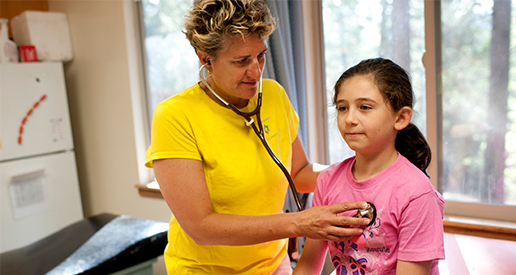
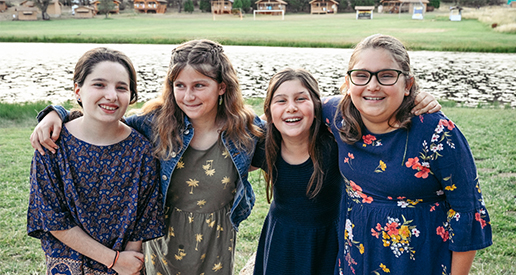
Health & Safety
Your child’s health and safety guide everything we do at Camp Tawonga. From daily supervision and staff training to clear systems that keep campers accounted for and supported, care is built into every moment at camp.
🏥 Illness at Camp
Our Approach to Health & Wellness
The safety and well-being of our community is our top priority. Tawonga’s approach to illness is grounded in current best practices, guidance from medical professionals, and a deep commitment to caring for each child with compassion and attentiveness.
Our health protocols are developed in partnership with Tawonga’s Health and Wellness Committee and are designed to support individual campers and the health of the broader Camp community.
Health Care at Camp
Tawonga’s fully equipped Health Center is staffed 24 hours a day throughout the summer.
Our medical team includes:
- A doctor, nurses, and medical assistants
- Volunteer physicians who rotate throughout the summer and specialize in emergency medicine, pediatrics, or family medicine
In 2021, we opened a brand-new Health Center with upgraded amenities, including multiple private isolation rooms and additional spaces available as needed.
Preventing Illness at Camp
We take proactive steps to minimize the spread of illness, including:
- Asking families to ensure children arrive at Camp healthy
- Encouraging frequent handwashing throughout the day
- Supporting campers in visiting the Health Center if they aren’t feeling well
If a Camper Gets Sick
If a camper develops a fever, more serious cold, upper respiratory infection, stomach virus, or anything that causes them to need to spend the night in the Health Center:
- They will rest and recover in the Health Center
- Parents will be contacted
- Our medical team will closely monitor their care
When a camper is fever-free for 24 hours and feeling better, they may rejoin their bunk. In some cases, campers may be well enough to leave the Health Center but still have mild, lingering symptoms. Based on the discretion of the Head Nurse and volunteer physician, campers may:
- Sleep on the porch of their cabin for a night or two
- Wear a mask temporarily to help prevent illness from spreading
🛡️ Camper Safety
Camp Tawonga places the safety and security of our campers and staff as our top priority. We follow a comprehensive set of best practices to create a safe environment, which includes thorough background checks for staff, robust emergency protocols, and regular training in safety procedures.
Counselors and all staff are trained to manage campers throughout the day, to anticipate needs, and to respond quickly and thoughtfully to concerns. Every activity, transition, and free time is supervised with intentional oversight and support so that your child is always part of a safe, connected group. Campers are always nearby trained adults, whether washing hands, playing games, hiking, or eating meals.
💊 Medications at Camp
While your child may be used to self-administering medications, at Camp ALL medications (including vitamins, herbal remedies, balms, and supplements including melatonin) must be stored and administered by our Health Center Staff, with three exceptions:
- Inhaler
- EpiPen or similar device for emergency use
- Diabetes supplies
Ordering Medications – Perris Hills Pharmacy
All medications and OTC treatments (e.g. allergy meds, vitamins, sleep aids and creams/ointments) that your child will be taking regularly during Camp must be ordered in advance through our pharmacy partner, Perris Hills Pharmacy (they send dosed and labeled blister packs for our Health Center to administer).
Summer camp is not the place to take a “med vacation” – children taking medications that help them focus will be more likely to succeed if they continue using these medications while at Camp.
💉 Vaccinations
Every child must be up-to-date on the standard childhood vaccinations in order to attend Tawonga: polio series, measles, mumps, rubella and tetanus toxoid. Tawonga strongly encourages being up to date on the COVID-19 and influenza vaccinations as well as having a negative TB test within the past 24 months.
Because camp involves close living quarters and lots of time spent together, illnesses like flu and COVID-19 can spread quickly. In recent summers, we have seen campers miss several days of camp — or occasionally need to return home early — due to these illnesses. Making sure your child arrives healthy, and staying up to date on recommended vaccinations are some of the best ways to help protect your child and our camp community, and to ensure campers can fully participate in the camp experience.
If your child has not been vaccinated, please contact our San Francisco office to speak with a director.
🌡️ Arrive Healthy & Lice Free
Arriving Healthy
To keep illnesses out of Camp, children must arrive healthy and symptom free. Please call or email the San Francisco office if your child is experiencing any symptoms so we can figure out the best plan for arrival. If your child has been sick in the week leading up to Camp with a virus (fever, a runny nose, congestion, stomach virus symptoms, cough, aches, etc.), please contact our office for next steps which may include pre-Camp testing to rule out illnesses. We may ask families to delay the start of Camp if a child has been recently ill.
Arriving a day or two late is far better than bringing a contagious illness into Camp. Our team will help any camper who arrives late integrate smoothly into their bunk and the Camp community. Your partnership supports the health and safety of our entire Camp community.
Lice Checks
Please check your child for lice the weekend prior to Camp. If you find any evidence of lice:
- Treat your child before arrival
- Ensure they are completely lice-free before coming to Camp
- Let us know if your child has had lice or has been treated in the days leading up to Camp – sharing this information helps our team support your child and can sometimes prevent unnecessary repeat treatment.
As a preventative measure, each camper is checked for head lice on the first day of the session and any children who are found with lice are treated by professionals. Those families whose children have lice at Camp will incur the direct cost of the treatment (approximately $200 – $300) per child.
📞 How will you keep us up to date on the health and wellbeing of our children?
We will call you if your child sleeps in the Health Center, has a significant illness or is having difficulties adjusting to Camp. Otherwise, no news is good news! You are welcome to reach out to us for an update on how your child is doing by contacting us at [email protected] or calling our San Francisco office at 415.543.2267. We will respond to all inquiries within 24 hours during normal business hours. You are also welcome to follow the blog for updates from Tawonga – subscribe here.
💕 Mental/emotional health support and programming
We are prepared and ready to support campers with their mental health. Our counselors go through a weeklong training which prepares them to handle situations that may arise. This includes training from our therapists around supporting campers’ mental health. In addition, we have a team of inclusion counselors, unit heads, directors and therapists that are ready to support as needed.
Therapy Sessions
Some children will meet with a Camp therapist during their stay at Camp if we think it will help them have a more positive experience. If your child is currently seeing a therapist:
- Please complete the Consent to Release Confidential Information form in your CampInTouch account or Campanion app
- Campers who see a mental health professional regularly at home are welcome and supported in having Zoom or phone therapy sessions while at Camp
If you have questions about Camp therapists or mental health supports, we encourage you to contact the San Francisco office before your child’s session begins.
We are deeply committed to creating a Camp experience that is emotionally and physically safe, nurturing, and supportive for every child.
🔥 What precautions has Tawonga taken to protect Camp from wildfires?
Tawonga has spent over a million dollars on fire prevention on our property in the last decade. We have undergrounded all of our PG&E electrical wires. We remove dead and fallen trees and brush annually through prescribed burns, reducing fuel load and increasing defensible space. We have our own wells and water tanks and store a million gallons of water on site for fire fighting. Our lake can be used as a dip site. Our property is inspected annually by CALFIRE. The CALFIRE Division Chief in the Tuolumne-Calaveras Unit told us that he wishes everyone managed their property as well as Tawonga does.
🌬️ What plans are in place in the case of unhealthy air quality during a Camp program?
- Tawonga has developed guidelines that follow both the EPA’s and the Tuolumne County Health Department’s recommendations for when to limit activities based on air quality.
- Tawonga’s Dining Hall has been upgraded to allow cooling and air filtration and can be used as an indoor programming space during poor air quality events.
- When air quality is unhealthy, we are prepared to take the following actions:
- Monitor campers
- Modify activities or reduce strenuous outdoor exertion
- Move campers indoors, including to our cool, air-filtered Dining Hall
- Consider evacuation if necessary
🚨 Emergency Preparedness at Tawonga
At Tawonga, we have an excellent process in place to ensure we receive early warnings for emergencies. We participate in a community alert and warning system called Everbridge that is used by public safety agencies in Tuolumne County to send real-time alerts and advisories via text, phone, and email.
In addition, our Camp leadership uses the platform Watch Duty, which provides real-time wildfire information and alerts to users. Information shared on Watch Duty is provided by official data sources as well as human monitoring by experienced volunteers, including active and retired firefighters, dispatchers, and first responders.
Tawonga has a siren, two-way radio, and PA system that is used in case of emergency to alert everyone to leave their cabins and assemble at our designated meeting place, and we rehearse this each session on the first day of Camp with all campers.
Our Camp leadership is excellent and highly experienced; in fact, Camp Tawonga has trained dozens of organizations and camps in incident preparedness and response. Before the season begins, we review and update all of our evacuation plans and situational guidelines, and run a tabletop exercise with our year-round staff.
During staff training week, we train all of our summer staff on how to respond to emergencies, and we run a drill to practice our incident response systems. Every June, we invite local officials from CAL FIRE, the U.S. Forest Service, Dept of Homeland Security, local law enforcement, and neighboring camps to Tawonga to collaborate on strengthening our region’s emergency preparedness, aligning on protocols, and sharing best practices to ensure the safety of our community.
The physical and emotional safety and well-being of our campers, staff, and the entire at-Camp community is always Tawonga’s number one priority.
🔒 What is security like at Camp Tawonga?
- Camp Tawonga places the safety and security of our campers and staff as our top priority. We follow a comprehensive set of best practices to create a safe environment, which includes thorough background checks for staff, robust emergency protocols, and regular training in safety procedures.
- The physical site at Camp Tawonga is equipped with appropriate security measures, including an experienced security guard, to protect campers and staff. Access to the camp is controlled, and perimeter security measures are in place. These measures are continually assessed and updated as needed.
- We have well-established emergency protocols in place to address a variety of situations, including medical emergencies, natural disasters, and other unforeseen events. These protocols are regularly reviewed and updated to align with the latest best practices in emergency management.
- In addition, Tawonga’s site is not easily identifiable as Jewish. There is nothing in our name or in our facility that identifies us as Jewish, and our location is remote and largely unmarked.
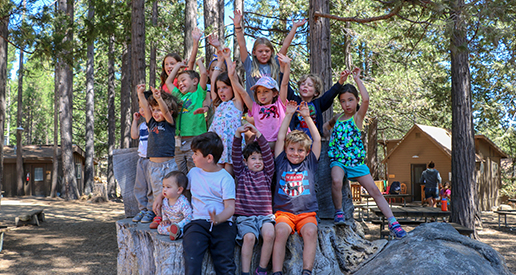
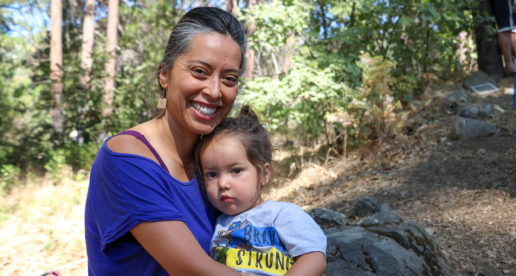
Weekend Programs
Weekend offerings
In 2026, we will be offering eight Family Camp weekends! Our weekend family programs are designed to combine all the best parts of a summer session at Tawonga into an extended three or four day weekend for the whole family! We welcome infants through grandparents for a unique blend of classic Camp activities, campfires, song sessions, a festive Shabbat celebration, family bonding, and fun!
In addition to these programs we will be running Ready, Set, Camp (a fun pre-camp visiting weekend for first time campers and their families), Women’s Weekend, Men’s Weekend, and Teen Winter Retreat programs.
Click here to see dates and rates.
Can I sign up with another family?
You can try to register for the same weekend with friends. However, we can not guarantee you will get into the same weekend. We have limited spaces and want to make it fair for everyone.
Each family needs to register separately. The only exception to this rule is that additional adult family members, such as an uncle or grandparent, can be added to your registration. They will be housed in your cabin.
An au pair or nanny can also be added to your registration. They will be housed in your cabin.
Families may receive 20% off program fees for sharing one of our traditional camper cabins with another family. Camper cabins house up to 16 individuals; two families would share one large camper cabin. This option is recommended for families with children ages 6+.
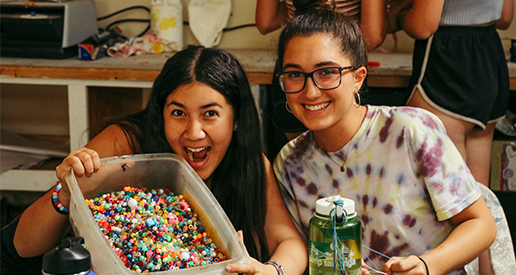
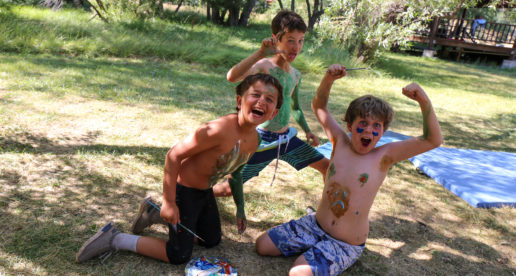
Financial Information
Cancellation policies
See our 2026 cancellation policies here.
Trip insurance
Because you may be registering for a program months before it begins, we strongly suggest your family purchase a trip insurance policy to protect your investment in the unlikely event that you need to cancel. Some brokers also offer trip interruption insurance, which may cover situations like a camper leaving early due to illness. We recommend you contact trip insurance brokers to understand what types of situations and cancellations they cover.
The closer you get to the start date, the less refund is available to you and as such, a trip insurance policy is likely the best way to protect your investment in Camp programs. Please note that most trip insurance companies require a policy to be purchased within 15 days of enrollment. Tawonga does not recommend or endorse any particular company or policy and we encourage you to speak to your insurance broker for trip insurance needs.
Below are some websites that offer comparisons of the wide range of trip insurance products:
https://www.forbes.com/advisor/travel-insurance/best-travel-insurance/
Financial assistance
Tawonga’s financial assistance program helps campers, adults and families from a wide range of socio-economic backgrounds experience the transformative Tawonga mission. We offer a variety of need-based assistance and need-blind grants, as well as interest-free payment plans.
We provide need-based assistance on a rolling basis, with the largest grants going to those with the highest demonstrated need based on a variety of factors. We do our best to support all of our families’ needs, while also taking into account our limited pool of funds. We cannot guarantee that grants will match from one year to the next, as each year brings new applicants and financial realities.
Learn more about our financial assistance program here. We will be happy to help you navigate all of the options available to you.
Does applying for financial assistance affect my chances of getting into Camp?
No! Our goal is to lower financial barriers to make attending Camp a reality for our campers. If receiving Financial Assistance could support your family’s access to Camp, we encourage you to apply.
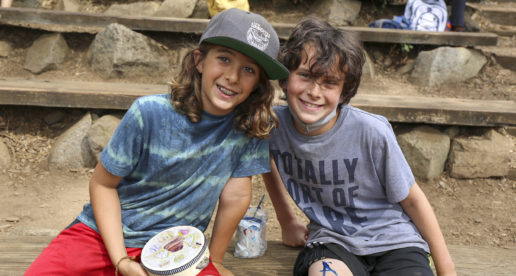
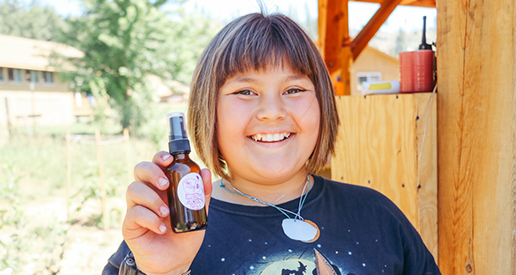
Camp Tawonga’s Approach to Israel
As a Jewish camp, Tawonga has a long and cherished relationship to Israel – to Israelis, to its culture and language and to the rich diversity of Israel’s people. Tawonga cares deeply about the lives of Israelis and Palestinians. We are heartbroken over the loss of life from the Israel-Hamas war and pray for the swift return of remaining hostages in Gaza. Tawonga wants peace and safety for people in Israel, Gaza and surrounding areas. Read on for commonly asked questions on the topic.
Israel Programming
Campers will have the opportunity to learn Israeli dance and music, make foods popular in Israel (think shakshuka!), learn about the country’s geography, learn some Hebrew and phrases in other languages spoken in Israel, learn about the diverse groups of people living in Israel and more.
Shlichim (Israeli staff)
Part of the camper experience is understanding Tawonga as part of a “global Jewish family,” which includes Israel. One way that we foster a connection to the culture and people of Israel is through bringing Israeli staff (“Shlichim”) to work at Camp as part of our summer staff. Tawonga has brought Shlichim to Camp for 40+ years.
Summer Staff & Personal Politics
All hired staff are required to uphold a clear code of conduct that includes keeping personal political beliefs private (along with other private matters). All staff understand Tawonga’s relationship with Israel and will not discuss their political views with campers. Staff will remain focused on delivering transformative, mission-centered experiences throughout the summer and supporting the mental and physical well-being of every camper.
Additional Questions?
We know this is a lot of information to take in, and we are here to support you! Feel free to email [email protected] or call us at 415.543.2267 to speak with a member of our year-round team. We’re happy to help!
New enrolled families will also be invited to join an orientation to meet with Tawonga directors and ask specific questions. Learn more and RSVP here in the spring.
